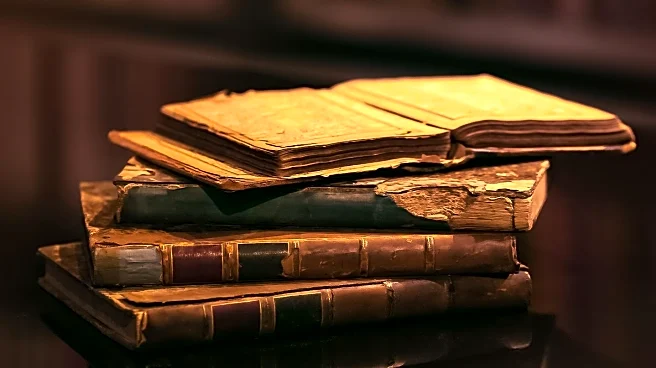What's Happening?
A significant discovery of rare Jewish religious books has been made in the basement of a Jewish-owned building near the Nożyk Synagogue in Warsaw. These books, some believed to be from the Library of the Chachmei Lublin Yeshiva, were found in a severely deteriorated state, covered in mold and fungi. The collection, weighing up to 1.5 tons, was discovered by members of Warsaw's Jewish community, who then sought the expertise of Piotr Nazaruk, a Polish government curator and historian. Nazaruk, along with historians Monika Tarajko and Andrzej Trzciński, is working to assess and preserve the books. The books are being carefully sorted and identified, with special attention given to those printed before 1800 or bearing unique markings. Despite the damage, several hundred books have been preserved, including volumes with original stamps from the Chachmei Lublin Yeshiva.
Why It's Important?
The discovery and preservation of these books are crucial for maintaining Jewish cultural and historical heritage, particularly those related to the pre-Holocaust era. The Chachmei Lublin Yeshiva was a significant center of Jewish learning, and the recovery of its library materials offers a rare glimpse into the religious and educational practices of the time. The preservation efforts not only safeguard these texts for future generations but also honor the memory of the Jewish communities that were decimated during the Holocaust. This initiative highlights the ongoing importance of cultural preservation and the challenges faced in restoring historical artifacts that have suffered extensive damage.
What's Next?
The preserved books will undergo a thorough cleaning and restoration process by a specialized company. Once restored, books identified as belonging to the Lublin Yeshiva will be transferred to Lublin, while others will be distributed to museums, libraries, and synagogues dedicated to preserving Jewish memory. This distribution will ensure that the books are accessible for educational and commemorative purposes, furthering the understanding of Jewish history and culture. The restoration process will also address health risks posed by the contamination of the books, ensuring they are safe for handling and display.









